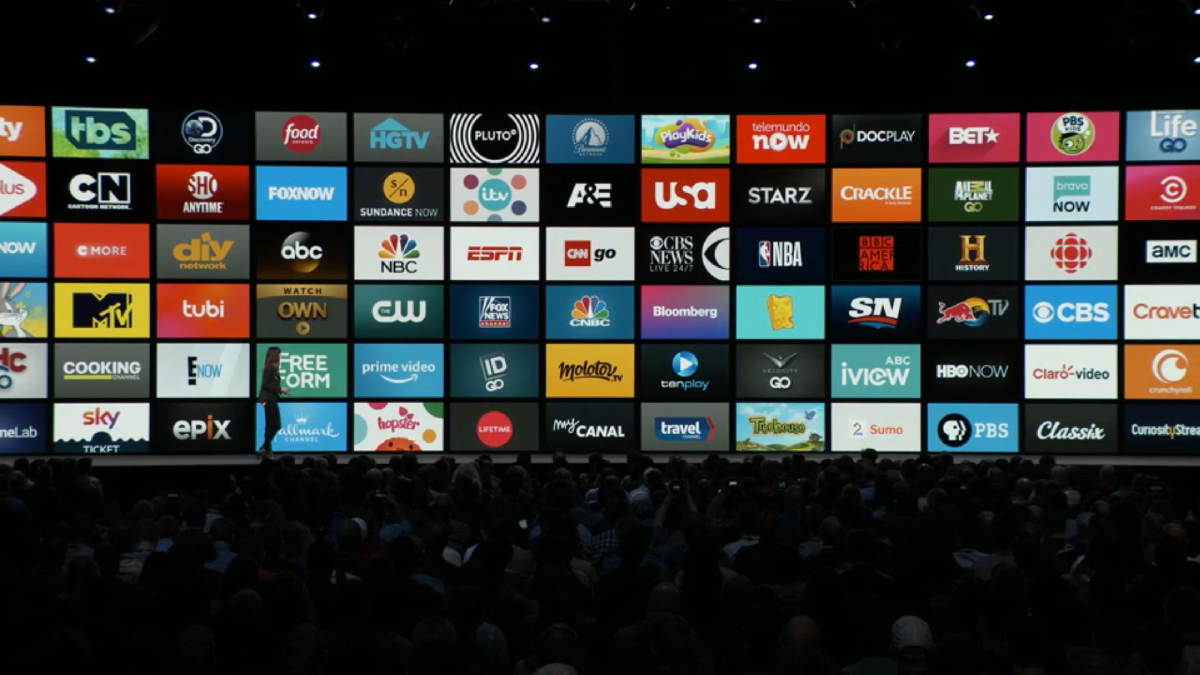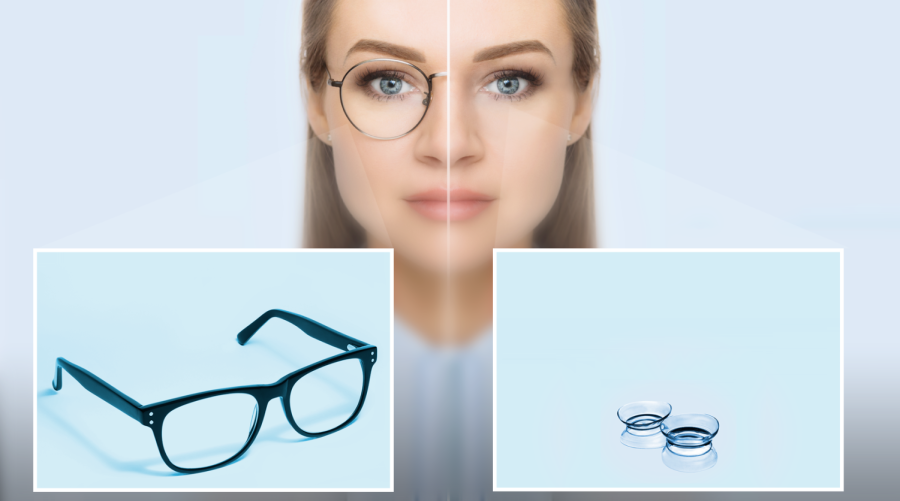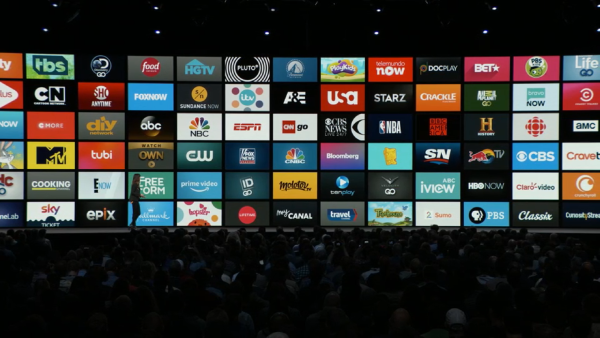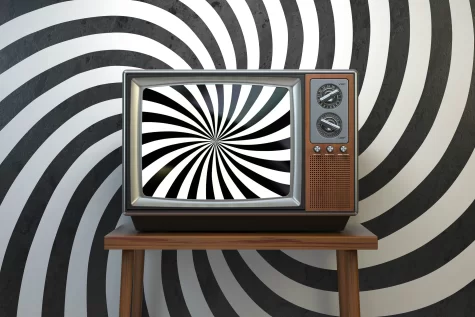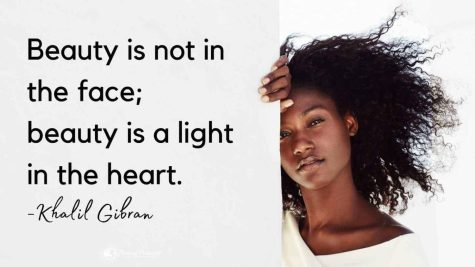Glasses Vs. Contacts
The importance of wearing vision correction eyewear when needed is common knowledge; however, choosing the right form of eyewear is just as significant. The right usage of eyewear could mean the difference between passing and failing a class. Whether the right choice of eyewear is glasses or contact lenses is purely subjective to the costumer’s preference. This, however, does not mean that there aren’t clear pros and cons to each eyewear that may sway the opinion of each individual. Before selecting the product that will provide you with arguably your most important sense, you must be educated on what exactly you’re picking.
Although some people may lean away from glasses because of their effect on appearance, wearing glasses actually has a lot of benefits. Glasses are easier to wear, safer on the eyes, and long-lasting. Unlike contact lenses, you don’t need to touch your eyes to wear glasses. Simply putting on glasses is less time-consuming and reduces the risk of infection in the eyes.
Another benefit of wearing glasses is the fact that, as long as they are not broken or lost, they last much longer.
According to warbyparker.com, “With proper care, glasses are designed to withstand the test of time. This makes them a cost-effective investment.”
One pair of glasses can last for many years, while the longest lifespan of contact lenses is one month.
However, wearing glasses does have its downsides. For instance, glasses could get lost or broken. Glasses could cause irritation by fogging up vision, causing glares, slipping off the nose, or leaving marks on the nose.
According to allaboutvision.com, “Eyeglasses sit about 12mm (about a half inch) from your eyes, so peripheral vision can be distorted. Many people also report difficulty focusing on objects and blurry vision when they first start wearing glasses or change prescriptions.”
Glasses may also cause insecurities for the person wearing them, some might prefer the way they look without glasses. If the costs seem to outweigh the benefits for glasses, gladly there are other options.

Similarly to glasses, the usage of contact lenses also has many pros and cons. Contact lenses cover the peripheral vision, make physical activity and sports easier, and temporarily enable the possibility of different eye colors. Contact lenses also do not affect the physical appearance of the wearer (unless they wish to change their eye color) and they make wearing sunglasses possible. Contact lenses sit directly on the eye, they do not have a frame that could affect your peripheral vision or change your appearance.
According to warbyparker.com, “Because they sit on the surface of your eyes and move with them, contact lenses provide seamless vision correction. Their benefits extend to your peripheral vision and they won’t have the same types of visual disruptions that glasses do, such as reflections or fogginess.” This also means that contact lenses will not continuously fall off of your face while playing sports, exercising, or even simply looking down. Contact lenses also do not need to be continuously cleaned throughout the day due to fog, rain, or dust.
However, this does not mean that there aren’t problems that come with contact lenses. Contact lenses are more difficult to apply than glasses and applying contact lenses poses a great risk of infection or even blindness. Although contact lenses do not need to be cleaned throughout the day, when applying contact lenses, you have to be sure that the lenses as well as your hands are completely clean.
According to allaboutvision.com, “If you accidentally fall asleep while wearing daily wear contacts, your eyes typically will be dry, gritty, red and irritated when you wake.” Wearing contact lenses also takes time to get used to, which means that contact lenses may be irritable during the first couple of uses. There isn’t a definitive answer on whether glasses or contact lenses are the better option, it comes down to personal preference and perspective.

However, when asked about their preference, most students at Wesley Chapel High School chose contact lenses over glasses.
Senior, Raynick Ortiz stated that he prefers contact lenses over glasses. “Contacts, because you don’t have to deal with getting your vision fogged up like you do with glasses. Also, you can look around and move your head as much as you want and as fast as you want without having to worry about your contacts falling off like you do with glasses. Also you don’t get the tan mark of having glasses on your face and you don’t have to push your contacts up every 5 seconds like you do with glasses” says Raynick. He goes on to say, “the only downside to contacts is you can’t have them on 24/7 and you have to take them off before sleeping or you’ll get an infection and could risk being blind.”
Junior, Keira Getz-Alsup agrees with Raynick, stating that “I prefer contacts mostly because I don’t have to worry about glasses getting in my way or dealing with a glare in my glasses whenever I take photos.”
When they were asked about the process of maintaining glasses or contacts, both Raynick and Keira agreed that contacts were much easier.
Keira stated “For me personally, I think it’s easier to keep up with contacts since glasses always get dirty. Meanwhile, all you have to do to keep your contacts clean is to rinse them in saline solution.”
While Keira discussed the ease of maintaining contact lenses, Raynick discussed the difficulty of maintaining glasses.
Raynick stated that “glasses could break so many different ways, like if you’re careless and take them off on your bed then later on forget that they’re there, you could end up sitting on them and breaking them. You could also take them off when you’re on vacation and then forget about them.” Raynick also pointed out the fact that if glasses are misplaced, the wearer will need to be wearing their missing glasses in order to find them.
Whether you decide on wearing contact lenses or glasses is entirely subjective. Some people may prefer the ease of simply putting on glasses, while others may want to use eyewear as invisible as contact lenses. Both choices are unique and beneficial in their own way and share the purpose of improving vision. It is important to make an educated decision when it comes to a matter as important as vision and what may be best for one person may be different for another person.
At the end of the day, both contact lenses and glasses are meant to make life easier, not harder.
Your donation will support the student journalists of Wesley Chapel High School. Your contribution will allow us to purchase equipment and cover our annual website hosting costs.









